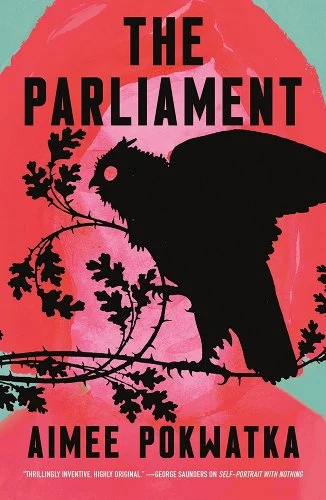A perennial favorite meme in my household—now used as a shorthand in many gift-giving situations—is “I never understood the owls.” Reading The Parliament by Aimee Pokwatka is another perfect application of the meme, since who could ever really understand the sudden appearance of thousands of murderous owls?
Yep, owls. The ancient symbols of wisdom that are actually kind of dumb, and which in the modern era mainly feature in cute animal compilations. It’s hard to be scared of perpetually startled poofballs, even if they are theoretically predators, but Pokwatka works very hard to convince us that a swarm of owls is no joke. She does succeed quickly in quelling any sense of absurdity: by the time the first body hits the ground, you won’t find the situation remotely silly.

Scary though? Not entirely. This book isn’t setting out to scare you, just to unsettle you with its non-explanations. Not understanding the owls is kind of the point. Beset by an inexplicable force (seemingly) beyond their control, a group of unlikely library patrons must come together despite their differences to protect the most vulnerable among them and—hopefully—survive an increasingly murderous natural phenomenon.
As a metaphor for our times, a horde of formerly-benign creatures descending to commit widespread but random acts of violence without method or moral is not inapt. Violence has become so endemic that it seems all but natural. The ineffectual fumbling of government and military are on the nose, too: when faced with something we don’t understand, humans don’t usually do a great job of responding with logic or giving their attention to those in need.
This isn’t climate fiction or even particularly issue-focused fiction. The theses of the book are both intensely personal and deliberately social, insisting on the need for both personal bravery and collective action. In that dualism, Pokwatka is wildly successful. Mad’s journey to breaking down her own personal defenses is poignant, and the gradual coming together of the community is moving without being schmaltzy. It’s a fairly realistic look at people of all ages, genders, political beliefs, and values who have to work together in order to protect children and not get killed. Basic stuff; they still almost don’t manage it.
Part of Mad’s strategy for keeping calm is reading a book she enjoyed as a kid, one that helped her with her own trauma and that she hopes will encourage the kids she’s cooped up with (sorry about the pun). The Silent Queen is a book within a book about a young ruler whose subjects are preparing for an annual pilgrimage to a dreadful beast, which gives girls magic powers but at the cost of parts of themselves: limbs, senses, and sometimes their lives. Queen Alala also went on this journey when she was younger, and lost her ability to speak. When she is given an unexpected chance to change the status quo, Alala must decide whether she is willing to defy the beast and relinquish its benefits to her kingdom for the sake of the girls. It’s a great idea and it’s a great execution: I loved the Alala sections and waited impatiently for Mad to return to The Silent Queen when she was dealing with the owl crisis, or more often, with the personalities trapped in the library by the owl crisis.
I’m usually a big proponent of realistic elements grounding fiction, but there is such a thing as too much realism, and The Parliament gets tripped up by insisting on both a bit too much detail and a bit too much randomness. In terms of detail, while I agree that anyone—and especially teens—would certainly complain and freak out, I don’t particularly want to read every single exclamation, accusation, and snippy comment. And though I agree it takes time to work through grief, Mad tortures herself endlessly with guilt while withholding the true cause of that guilt from the audience, suspense that became a bit tedious as the cause became obvious.
There’s also too much realism at a meta level, since The Parliament also doesn’t drawn very many parallels between its own narrative and The Silent Queen. I’m not asking for twee convergences between Alala’s and Mad’s circumstances in every set of chapters, but some additional confluences would have been nice. The dual (duel) narratives don’t really complement each other as much as they should. Until the last 20% or so of the book, it felt like I was actually reading two books, both of which were enjoyable, but which had been written at different times by different people for different purposes entirely.
Part of that is the fact that Mad’s narrative is so odd. I love odd, but a swarm of killer owls kind of needs to be its own book. To try to explain or gloss it with additional fantasy elements—especially a whole secondary world with its own set of inexplicable rules and dangers—just confuses matters. Though good unto itself, Alala’s story didn’t feel necessary to Mad’s, except that Pokwatka kept telling us it was. And because she kept insisting on that, I kept trying to see parallels that actually weren’t there for the most part, distracting me from both individual stories.
That Pokwatka manages to twine these two stories at all is remarkable, a true testament to her writing abilities and command of narrative. I give her credit for that, but remain unconvinced by the format. Maybe this could have been better if the Mad narrative had only alluded to the Alala story, and then the Alala story had been released separately as a novella or something. Overall I still think this book is worth picking up, especially for the two very satisfying endings it takes pains to truly earn. Pokwatka took an impressive risk with The Parliament, and though it’s uneven, I am excited to see where her creativity will lead us next.
The Parliament will be released January 16, 2024.
